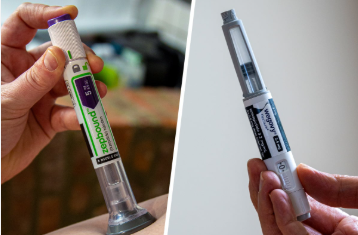In a head-to-head clinical study, participants in Eli Lilly’s weight-loss medication Zepbound lost more weight than those on Novo Nordisk’s Wegovy, the company announced in a news release on Wednesday.
Lilly financed the study, which compares the two competing weight reduction medications in the first randomized, controlled clinical trial. Prior research has demonstrated that Zepbound is more effective than Wegovy in terms of weight reduction; however, because previous studies relied on historical data, they were not regarded as accurate comparisons.
The findings of Lilly’s experiment showed that after 72 weeks, patients who received weekly injections of Zepbound lost an average of 20.2% of their body weight, or 50.3 pounds, while those who received Wegovy dropped an average of 13.7%, or 33.1 pounds.

According to Lilly, this indicates that Zepbound offers 47% more weight reduction than Wegovy.
While Zepbound was more successful than Wegovy in reducing weight, both medications are very effective, according to Dr. Susan Spratt, an endocrinologist and senior medical director for the Population Health Management Office at Duke Health in North Carolina.
According to Spratt, “the amount of weight loss with both is astounding.”
The results, which were revealed in a press statement on Wednesday, are not yet accessible for peer review. According to Lilly, the findings would be presented at a medical conference the following year.
“In combination with diet and exercise, Wegovy is the only obesity medicine proven to reduce the risk of major cardiovascular events such as death, heart attack, or stroke,” a Novo Nordisk spokesman said in a statement, highlighting the heart-healthy advantages of the medication.
The findings were based on 751 people who were randomly assigned to receive one of the two highest dosages of either Wegovy or Zepbound throughout the United States, including Puerto Rico. People were either obese or overweight.
Both Zepound and Wegovy’s most often reported adverse effects, according to Eli Lilly, were gastrointestinal in nature and “generally mild to moderate in severity.”
The adverse effects of Zepbound and Wegovy are essentially the same, according to gastroenterologist Dr. Christopher McGowan, who operates a weight reduction clinic in North Carolina. However, his patients typically report that Zepbound works better for them.
Gastrointestinal issues, such as nausea, vomiting, and stomach discomfort, might be side effects of the medications.

Tirzepatide, the active component of Zepbound, is also included in Lilly’s diabetic medication Mounjaro. Semaglutide, which is also included in Novo Nordisk’s diabetic medication Ozempic, is an ingredient in Wegovy.
Both operate similarly: The GLP-1 medications work by imitating a hormone that lowers hunger and food consumption.
Nevertheless, tirzepatide also mimics a second hormone, GIP, which is believed to enhance the body’s breakdown of fat and sugar in addition to decreasing hunger.
According to Spratt, she would want to see further research that links the medications to health outcomes other than weight reduction.
For instance, it has been demonstrated that Wegovy lowers the risk of heart disease in those who are obese or overweight. It has been demonstrated that Zepbound may be used to treat obstructive sleep apnea.
“I don’t believe that was the purpose of this trial, but it will be crucial in determining which medication to suggest,” Spratt stated.
According to McGowan, patients take into account other factors besides weight loss.
“The majority of patients who seek GLP-1 treatment select the option that best suits their needs in terms of cost, availability, and insurance coverage,” he stated. “At this time, very few patients can be picky.”





